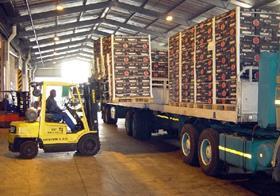
Amidst harsh and far-reaching measures introduced by the South African government to stop the spread of the Coronavirus, the South African citrus and topfruit industries are moving into their 2020 exports season filled with much uncertainty.
There is also little comfort for these industries in the fact that continued power disruptions because of the failing local electricity supply network and questions over the country’s port infrastructure are continuing to make things difficult.
The latest measures by the government to combat the Coronavirus will still be felt in future and it is clear that across the country fruit growers will be hit.
These measures include travel bans to affected countries, most notably China, South Korea, Italy, Germany, the UK, Spain and the US.
While minor ports have been closed for entry by people, the export terminals and therefore the flow of containers is not expected to be affected.
There are some concerns about the availability of containers being returned to South Africa. Crew transfers for vessels will however not be allowed in South African ports. The measures also place restrictions on internal travel and a number of border crossings between South Africa and its neighbours have been closed.
The table grape and stonefruit sectors are coming to the end of their seasons – with only the Hex River and Berg River grape regions still having to pack for a few weeks.
However, apples and pears are in their peak harvesting weeks and the citrus industry is only just starting. This is also the case for the avocado industry who have just landed its first containers of the season in the key markets of the UK and Europe.
The Citrus Growers’ Association (CGA), in announcing its forecast for the season said that there is now a number of issues that are beyondthe control of growers that could impact its season.
The CGA singled out the Coronavirus outbreak as a new challenge to fresh produce exporters across the globe. “It is encouraging that China’s logistics services are expected to be fully operational soon, with cargo volumes and ship calls having swiftly rebounded over the past two weeks.”
It says, however, that the outbreak across the European Union, the largest export market for South Africa’s citrus, remains a concern.
“This could still result in a decrease in demand and a shortfall of containers when the export season kicks off in May. It is therefore critical that exporters confirm that there are containers available before they start shipping,”
Apart from Coronavirus, the CGA said that challenges at South Africa’s ports, including ageing and out of service infrastructure as well as unresolved labour issues, remain a threat to export volumes.
“The Citrus Growers’ Association is proactively engaging with Transnet and welcomes recent steps taken by the company to improve operations at a number of the ports. This includes the procurement of new equipment for both the Port Elizabeth and Durban ports, which is expected to arrive before the start of the export season.”
Despite all this the citrus industry is still looking to expand its markets. “With the citrus industry expected to grow by a further 500,000 tonnes over the next three to five years, the Citrus Growers’ Association will continue to focus on opening and expanding market access in key markets, including China, USA, India, Philippines, Japan, Vietnam and the EU. The sector looks forward to working with all its partners during the upcoming season in order to achieve another record year, and to contribute towards job creation and inclusive growth in the country.”
The South African apple industry has over the past decade completely transformed its marketing regions – from the traditional markets of the UK and Europe to Africa, the Middle East and the Far East and South East Asia.
Sources have said that they are still experiencing good demand despite the virus. There are also indications that trading in China and other eastern markets could start recovering soon, which would further lighten the mood in future.



